By Lewis West · Tuesday, April 21, 2015 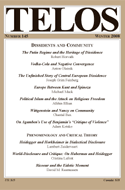 In her exploration of Wittgenstein’s elusive and scattered commentary on community, Chantal Bax notes the absence of an explicit understanding of community in the philosopher’s work. Though Wittgenstein often invokes communal concepts, he rarely provides any details regarding the exact nature of a proper community, or the maintenance and governance a just society requires. Bax highlights the one place where Wittgenstein succumbs to the “unfortunate metaphor” of the body politic: he suggests the Jews, marginalized by European society, resemble a “‘kind of disease, anomaly,'” a “‘swelling'” which can “‘only be considered to be a proper part of the body when the whole feeling for the body is changed'” (105). Bax reads this as a tragic and empathetic lament: Wittgenstein doubts the possibility of a renewed, welcoming society that nonetheless adheres to this same vocabulary of the political body. And it is this prophetic doubt that intensifies the crisis of community that reiterates the necessity of Wittgenstein’s rethinking of life together. In her exploration of Wittgenstein’s elusive and scattered commentary on community, Chantal Bax notes the absence of an explicit understanding of community in the philosopher’s work. Though Wittgenstein often invokes communal concepts, he rarely provides any details regarding the exact nature of a proper community, or the maintenance and governance a just society requires. Bax highlights the one place where Wittgenstein succumbs to the “unfortunate metaphor” of the body politic: he suggests the Jews, marginalized by European society, resemble a “‘kind of disease, anomaly,'” a “‘swelling'” which can “‘only be considered to be a proper part of the body when the whole feeling for the body is changed'” (105). Bax reads this as a tragic and empathetic lament: Wittgenstein doubts the possibility of a renewed, welcoming society that nonetheless adheres to this same vocabulary of the political body. And it is this prophetic doubt that intensifies the crisis of community that reiterates the necessity of Wittgenstein’s rethinking of life together.
Continue reading →
By Lewis West · Friday, March 13, 2015 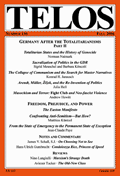 Catastrophic history does not free society: it allows the individual no exit from an endless spiral of destruction. Such destruction promises liberation for some, but it only tilts the world closer to ever-greater annihilation. To place one’s hope in redemptive violence constitutes a leap into the absurd. It is an act of pure faith. This is how Julia Hell, in her essay “Remnants of Totalitarianism: Hannah Arendt, Heiner Müller, Slavoj Žižek, and the Re-Invention of Politics,” reads the apocalyptic politics of Müller and Žižek. Hell frames her critique with a rigorous practicality: she laments Žižek’s “empty terms,” and likewise she sees the political writings of Giorgio Agamben and Judith Butler as hopelessly vague (103). Yet Hell’s rejection of Müller and Žižek does not reflect an entirely pragmatic method. While Hell insists on the need for a usable, specific politics, her attentive readings of each thinker also point to a vast philosophical disagreement. In the end, the true debate is not over the applications of theory. It is instead over the answer to a single question: what is the relationship of politics to death? Catastrophic history does not free society: it allows the individual no exit from an endless spiral of destruction. Such destruction promises liberation for some, but it only tilts the world closer to ever-greater annihilation. To place one’s hope in redemptive violence constitutes a leap into the absurd. It is an act of pure faith. This is how Julia Hell, in her essay “Remnants of Totalitarianism: Hannah Arendt, Heiner Müller, Slavoj Žižek, and the Re-Invention of Politics,” reads the apocalyptic politics of Müller and Žižek. Hell frames her critique with a rigorous practicality: she laments Žižek’s “empty terms,” and likewise she sees the political writings of Giorgio Agamben and Judith Butler as hopelessly vague (103). Yet Hell’s rejection of Müller and Žižek does not reflect an entirely pragmatic method. While Hell insists on the need for a usable, specific politics, her attentive readings of each thinker also point to a vast philosophical disagreement. In the end, the true debate is not over the applications of theory. It is instead over the answer to a single question: what is the relationship of politics to death?
Continue reading →
By Lewis West · Friday, February 27, 2015 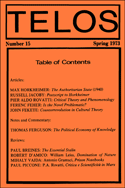 In November 1939, gangs of German civilians and Nazi operatives stormed Jewish stores, synagogues, and homes, killing or arresting those who could not escape. The Nazi leadership had carefully planned the assault—Kristallnacht would become only one among many instances of unimaginable horror. In the coming years, the Nazis proceeded to murder thousands of disabled Germans; when Germany invaded Russia, groups of special units—known as Einsatzgruppen—followed closely behind the German army, liquidating Jews, Communists, and Roma.[1] By 1942, the Nazi death camps had initiated yet another gruesome and terrifying phase of the Reich’s program of anti-Semitism and racial purity.[2] In November 1939, gangs of German civilians and Nazi operatives stormed Jewish stores, synagogues, and homes, killing or arresting those who could not escape. The Nazi leadership had carefully planned the assault—Kristallnacht would become only one among many instances of unimaginable horror. In the coming years, the Nazis proceeded to murder thousands of disabled Germans; when Germany invaded Russia, groups of special units—known as Einsatzgruppen—followed closely behind the German army, liquidating Jews, Communists, and Roma.[1] By 1942, the Nazi death camps had initiated yet another gruesome and terrifying phase of the Reich’s program of anti-Semitism and racial purity.[2]
Continue reading →
By Lewis West · Tuesday, October 7, 2014 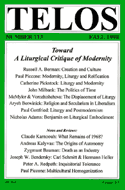 When Karl Marx described the commodity, he invoked the language of faith. For him, the commodity remained “a very strange thing, abounding in metaphysical subtleties and theological niceties.”[1] Marx, a dedicated secular economist, hesitated to pinpoint the exact power of the commodity. He could not fully understand it without recourse to a mythology he abhorred, one that far predated his radical recasting of accepted historical narratives. Here religion colors economics: the logic of exchange resembles a curious mysticism. When Karl Marx described the commodity, he invoked the language of faith. For him, the commodity remained “a very strange thing, abounding in metaphysical subtleties and theological niceties.”[1] Marx, a dedicated secular economist, hesitated to pinpoint the exact power of the commodity. He could not fully understand it without recourse to a mythology he abhorred, one that far predated his radical recasting of accepted historical narratives. Here religion colors economics: the logic of exchange resembles a curious mysticism.
Continue reading →
By Lewis West · Tuesday, July 1, 2014 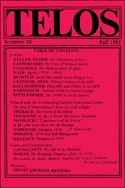 Utopia is necessary: it alone “can rescue a very limited reality” (16). Without it we are shackled by the thoughts of others, confined within realms of possibility defined by those in power. Peace, disarmament—both can seem idealistic, even ridiculous. But our incredulity results not only from the distance of these concepts from the everyday. We have been taught to understand pacifism as impractical, disarmament as suicide. Utopia is necessary: it alone “can rescue a very limited reality” (16). Without it we are shackled by the thoughts of others, confined within realms of possibility defined by those in power. Peace, disarmament—both can seem idealistic, even ridiculous. But our incredulity results not only from the distance of these concepts from the everyday. We have been taught to understand pacifism as impractical, disarmament as suicide.
Continue reading →
|
|
 In her exploration of Wittgenstein’s elusive and scattered commentary on community, Chantal Bax notes the absence of an explicit understanding of community in the philosopher’s work. Though Wittgenstein often invokes communal concepts, he rarely provides any details regarding the exact nature of a proper community, or the maintenance and governance a just society requires. Bax highlights the one place where Wittgenstein succumbs to the “unfortunate metaphor” of the body politic: he suggests the Jews, marginalized by European society, resemble a “‘kind of disease, anomaly,'” a “‘swelling'” which can “‘only be considered to be a proper part of the body when the whole feeling for the body is changed'” (105). Bax reads this as a tragic and empathetic lament: Wittgenstein doubts the possibility of a renewed, welcoming society that nonetheless adheres to this same vocabulary of the political body. And it is this prophetic doubt that intensifies the crisis of community that reiterates the necessity of Wittgenstein’s rethinking of life together.
In her exploration of Wittgenstein’s elusive and scattered commentary on community, Chantal Bax notes the absence of an explicit understanding of community in the philosopher’s work. Though Wittgenstein often invokes communal concepts, he rarely provides any details regarding the exact nature of a proper community, or the maintenance and governance a just society requires. Bax highlights the one place where Wittgenstein succumbs to the “unfortunate metaphor” of the body politic: he suggests the Jews, marginalized by European society, resemble a “‘kind of disease, anomaly,'” a “‘swelling'” which can “‘only be considered to be a proper part of the body when the whole feeling for the body is changed'” (105). Bax reads this as a tragic and empathetic lament: Wittgenstein doubts the possibility of a renewed, welcoming society that nonetheless adheres to this same vocabulary of the political body. And it is this prophetic doubt that intensifies the crisis of community that reiterates the necessity of Wittgenstein’s rethinking of life together.  Catastrophic history does not free society: it allows the individual no exit from an endless spiral of destruction. Such destruction promises liberation for some, but it only tilts the world closer to ever-greater annihilation. To place one’s hope in redemptive violence constitutes a leap into the absurd. It is an act of pure faith. This is how Julia Hell, in her essay “Remnants of Totalitarianism: Hannah Arendt, Heiner Müller, Slavoj Žižek, and the Re-Invention of Politics,” reads the apocalyptic politics of Müller and Žižek. Hell frames her critique with a rigorous practicality: she laments Žižek’s “empty terms,” and likewise she sees the political writings of Giorgio Agamben and Judith Butler as hopelessly vague (103). Yet Hell’s rejection of Müller and Žižek does not reflect an entirely pragmatic method. While Hell insists on the need for a usable, specific politics, her attentive readings of each thinker also point to a vast philosophical disagreement. In the end, the true debate is not over the applications of theory. It is instead over the answer to a single question: what is the relationship of politics to death?
Catastrophic history does not free society: it allows the individual no exit from an endless spiral of destruction. Such destruction promises liberation for some, but it only tilts the world closer to ever-greater annihilation. To place one’s hope in redemptive violence constitutes a leap into the absurd. It is an act of pure faith. This is how Julia Hell, in her essay “Remnants of Totalitarianism: Hannah Arendt, Heiner Müller, Slavoj Žižek, and the Re-Invention of Politics,” reads the apocalyptic politics of Müller and Žižek. Hell frames her critique with a rigorous practicality: she laments Žižek’s “empty terms,” and likewise she sees the political writings of Giorgio Agamben and Judith Butler as hopelessly vague (103). Yet Hell’s rejection of Müller and Žižek does not reflect an entirely pragmatic method. While Hell insists on the need for a usable, specific politics, her attentive readings of each thinker also point to a vast philosophical disagreement. In the end, the true debate is not over the applications of theory. It is instead over the answer to a single question: what is the relationship of politics to death?  In November 1939, gangs of German civilians and Nazi operatives stormed Jewish stores, synagogues, and homes, killing or arresting those who could not escape. The Nazi leadership had carefully planned the assault—Kristallnacht would become only one among many instances of unimaginable horror. In the coming years, the Nazis proceeded to murder thousands of disabled Germans; when Germany invaded Russia, groups of special units—known as Einsatzgruppen—followed closely behind the German army, liquidating Jews, Communists, and Roma.[1] By 1942, the Nazi death camps had initiated yet another gruesome and terrifying phase of the Reich’s program of anti-Semitism and racial purity.[2]
In November 1939, gangs of German civilians and Nazi operatives stormed Jewish stores, synagogues, and homes, killing or arresting those who could not escape. The Nazi leadership had carefully planned the assault—Kristallnacht would become only one among many instances of unimaginable horror. In the coming years, the Nazis proceeded to murder thousands of disabled Germans; when Germany invaded Russia, groups of special units—known as Einsatzgruppen—followed closely behind the German army, liquidating Jews, Communists, and Roma.[1] By 1942, the Nazi death camps had initiated yet another gruesome and terrifying phase of the Reich’s program of anti-Semitism and racial purity.[2]  When Karl Marx described the commodity, he invoked the language of faith. For him, the commodity remained “a very strange thing, abounding in metaphysical subtleties and theological niceties.”[1] Marx, a dedicated secular economist, hesitated to pinpoint the exact power of the commodity. He could not fully understand it without recourse to a mythology he abhorred, one that far predated his radical recasting of accepted historical narratives. Here religion colors economics: the logic of exchange resembles a curious mysticism.
When Karl Marx described the commodity, he invoked the language of faith. For him, the commodity remained “a very strange thing, abounding in metaphysical subtleties and theological niceties.”[1] Marx, a dedicated secular economist, hesitated to pinpoint the exact power of the commodity. He could not fully understand it without recourse to a mythology he abhorred, one that far predated his radical recasting of accepted historical narratives. Here religion colors economics: the logic of exchange resembles a curious mysticism.  Utopia is necessary: it alone “can rescue a very limited reality” (16). Without it we are shackled by the thoughts of others, confined within realms of possibility defined by those in power. Peace, disarmament—both can seem idealistic, even ridiculous. But our incredulity results not only from the distance of these concepts from the everyday. We have been taught to understand pacifism as impractical, disarmament as suicide.
Utopia is necessary: it alone “can rescue a very limited reality” (16). Without it we are shackled by the thoughts of others, confined within realms of possibility defined by those in power. Peace, disarmament—both can seem idealistic, even ridiculous. But our incredulity results not only from the distance of these concepts from the everyday. We have been taught to understand pacifism as impractical, disarmament as suicide. 






